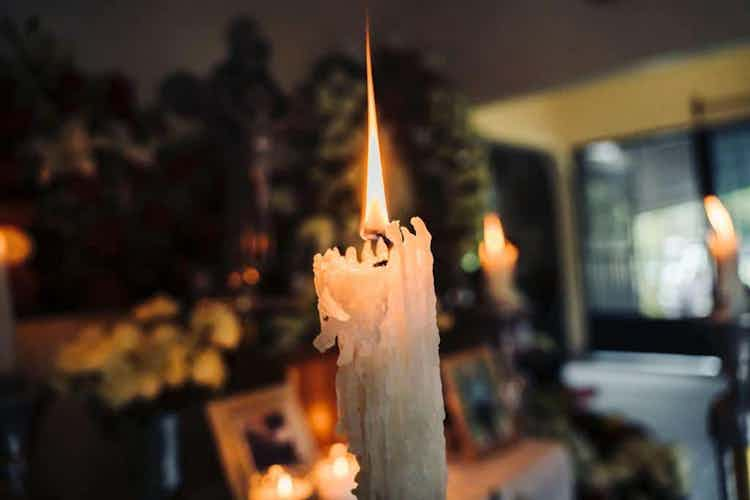If you’re not sure what you’re doing next weekend, you’re probably not the type to have a funeral plan. Lots of people haven’t thought about their funeral or bought a prepaid plan, so what happens if you don’t have a funeral plan?
As you age, your mortality does start to confront you. Getting your funeral planned and paid for is one of those tasks that might seem like something to do on a rainy Thursday during retirement. However, if you don't get round to it, someone still needs to deal with your funeral.
When someone has died without a funeral plan, there are different ways to handle it. We're going to look at the most common scenarios, so when you're the person left to plan a loved one's funeral, you know what your steps are. We'll cover:
- Planning a funeral when friends and family have money to pay for it
- How to draw any cash from the estate to pay for a funeral
- What happens when there are assets but no cash to pay for a funeral
- Who pays for a funeral when no one has the money to pay for it
There's no funeral plan, but the family have the money to pay
People dying without a funeral plan is common; only about 13% of people over 55 have a paid-up plan in place. If your loved one is one of the other 87% and you’ve got spare cash, you can choose to plan and pay for their funeral yourself.
With no plan in place, you’ll need to choose a funeral director yourself, if you want to use one. They’ll talk you through all the decisions you need to make and the different costs. You’ll need to make choices about:
- Whether to bury or cremate and where it’ll happen
- The style of the coffin
- How many cars, if any, you want for the service
- The music, readings, and order of service
- Flowers and charities to donate to
Funeral instructions aren’t left in a will, so you'll need to have either had a chat about what they wanted before they died or take your best guess at what they'd like in their send-off.
The bill for the funeral will be sent soon after the service, although you may have to pay other costs upfront, such as burial fees.
Once the estate has been settled, you'll be able to claim back the funeral costs before any inheritance is handed out. You don't have to – paying for someone's funeral might be the last act of kindness you want to offer to them.
The estate has cash available and there’s no funeral plan
As soon as practical after a person dies, someone needs to phone around places like banks, utility companies, pension providers, and let them know. Data protection ends once someone’s dead, so the bank should be able to tell you how much cash is in the bank, probably after you’ve sent over the death certificate.
When there’s money sat there, in a current account or savings, you should be able to draw on that cash to pay for the funeral. Each bank will have a slightly different system, but generally, the process is:
- Provide the invoice for the funeral, billed to you
- Prove your identity with a passport or drivers’ license for example
- The bank will settle the invoice directly with the suppliers
Not the executor of the estate according to the will? Where possible, try and speak to the executor whilst you’re going through the process to save confusion when they come to untangle finances later on.
The estate has assets but no cash and there’s no funeral plan
It's feasible for someone to die with a few hundred quid in the bank and a mortgage-free house worth £150,000, for example. When the value of the estate is tied up in assets, and there is no funeral plan, who pays for and plans the funeral?
There are two options. The first, we touched on a moment ago. If someone is prepared to wait to be paid back, a friend or family member can stump up to cash and claim it back from the estate. As long there are enough assets to cover the costs, it's not too risky, but getting probate granted and a house sold does take time.
The other option, if no one has the cash to cover the funeral upfront, is to let the government plan and pay for the funeral. This is called a Public Health Funeral, which we’ll go into next.
When no one has the cash to pay for or plan a funeral, what happens?
When there’s no spare cash knocking around to pay for a funeral, it’s then up to the government to deal with things. Since the government is picking up the tab, things will be cheap, not very cheerful, and on their terms.
A local government office or hospital arranges a Public Health Funeral. It's a very basic service which usually ends in a cremation – burials only happen if there were clearly stated wishes to that effect. There'll be someone to say a few words for the dead person, and anyone can attend if they want.
The timing of a Public Health Funeral isn’t in your control. They can happen quickly sometimes – my auntie got a call at 4 pm asking if she'd mind her brother's funeral being 10 am the next day otherwise it'd be two more weeks before it could happen.
What happens if you don’t have a funeral plan?
Without a funeral plan organised and paid for, you leave your funeral and the expense in the hands of the folk you leave behind.
Being tasked with organising and paying for a funeral for someone leaves you in control of everything. Enlisting the services of a funeral director will make life easier – they know who to call and what things will cost. Covering those costs will all depend on the money in the estate or lack of in some cases.
Not having a funeral plan leaves you at risk of getting a Public Health Funeral, sometimes still called a “pauper’s funeral”. This is a no-frills service that will see you cremated at a time that suits the local council. If you want something more suited to your tastes, make sure you get a plan created and paid for.








